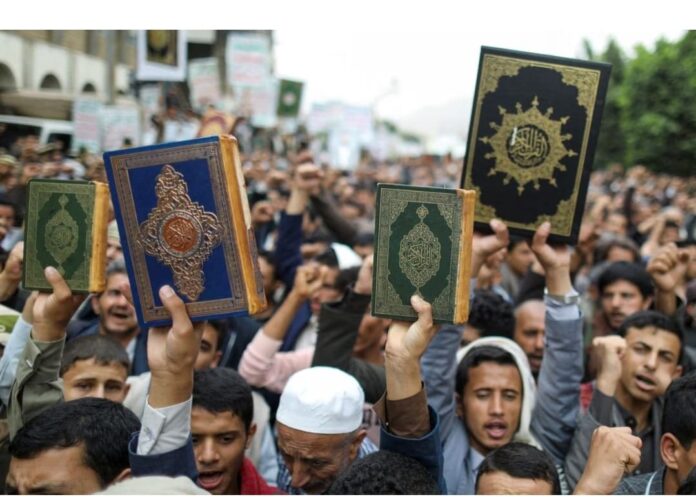In recent months, the global media has become increasingly concerned with the rise in Quran desecration incidents. These acts, predominantly carried out by Islamophobic individuals or groups in northern European and Nordic countries, have sparked outrage among Muslim countries and the international community.
One such group, the Danish anti-Islamic and ultranationalist organization “Danske Patrioter,” has persistently engaged in Quran burning. Their actions include burning copies of the holy book in front of embassies and a mosque in Copenhagen, accompanied by anti-Islamic slogans and under the protection of the police. Though initially, videos of these incidents were restricted, they were later shared on Facebook by the group.
The burning of the Quran, or any other religious text, can have far-reaching social and political implications, particularly in Denmark and Muslim-majority countries. This act has the potential to ignite tension and polarization among different religious and ethnic groups, leading to protests, debates, and even acts of violence as people express their anger or defend freedom of speech.
Moreover, Denmark’s relationship with Muslim-majority countries may suffer as news of Quran burning spreads. Diplomatic protests, boycotts, and travel advisories could impact trade, tourism, and bilateral relations. Extremist groups may exploit such incidents to fuel anti-Western sentiments, potentially posing security threats and enhancing the risk of terrorism.
The burning incident will reignite discussions regarding the balance between freedom of expression and religious sensitivity. Debates on hate speech laws, media responsibility, and legislation protecting religious symbols and texts may also ensue.
Condemnation of such acts is expected from international organizations concerned with human rights, religious freedom, and interfaith harmony, leading to extensive media coverage and a heightened impact.
Furthermore, this incident may affect working relationships between Danish institutions and counterparts in Muslim-majority countries. Economic consequences such as boycotts, divestment, or reduced business dealings with Danish companies may occur, jeopardizing existing contracts and future opportunities.
To address these concerns, it is crucial for the International Media Society (IMS) to utilize its influence within Denmark and international media outlets. IMS can lead the way in countering the negative perception caused by Quran burning, alerting the Danish private institutions both domestically and internationally about the gravity of disrespecting and desecration of the Quran.
Joint ventures and collaborations between Danish private institutions and their counterparts in Muslim-majority countries may face strain or dissolution. Trust may erode, resulting in broken agreements or strained relationships, hindering future cooperation.
Danish government and private institutions could face increased scrutiny and pressure to exhibit a commitment to cross-cultural understanding, diversity, and respect for religious sensitivities. Re-evaluating policies, practices, and intercultural training becomes imperative to rebuild trust within their networks.
It is important to acknowledge that the reactions and consequences may vary based on specific circumstances, stakeholder perception, and the response of Danish Government and private institutions. Clear communication of values, accountability if necessary, and engaging in meaningful dialogues can help mitigate any negative impacts.
To conclude, the consequences of Quran desecration can be significant and wide-ranging. Understanding the potential impact is crucial in addressing these concerns and fostering a culture of respect, diversity, and tolerance.
The End.
Mohamed Mohamud Adde An academic and Political Analyst.


